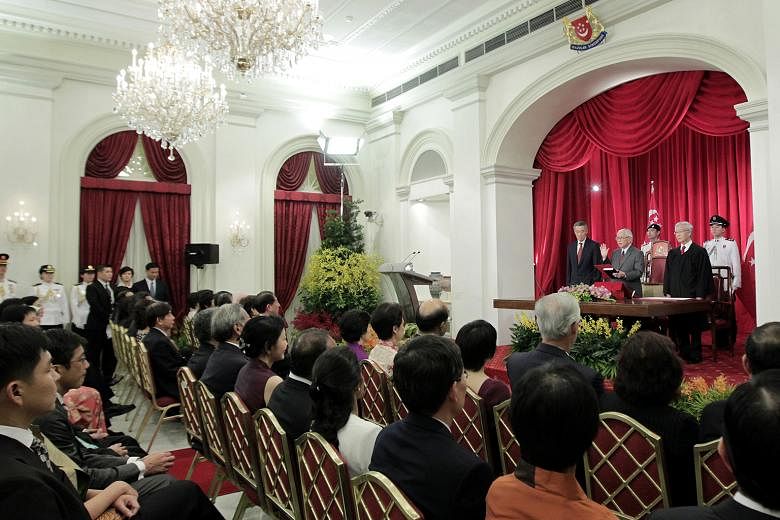While the Constitutional Commission's review parameters have three specific aspects - eligibility criteria, the role of presidential advisers, and providing for minority races - a fourth, left-of-field suggestion was also raised.
At the public hearings held by the commission, some played the devil's advocate and said the elected presidency should be scrapped altogether. Some suggested returning to the original system of having a nominated president, and radically changing the election procedure.
The ideas surfaced even though Prime Minister Lee Hsien Loong had made it clear that such proposals would not be on the table.
Announcing the impending review at the opening of Parliament in January, he said: "The President must remain an elected office. If the President is not elected, he will lack the mandate to wield his custodial powers."
SEPARATE ROLES
However, this did not stop Raffles Medical Group executive chairman Loo Choon Yong from saying, at one of the hearings, that the president should not be expected to shoulder the dual tasks of being both a ceremonial head as well as guardian of Singapore's reserves.
As he put it, it is unrealistic to expect one person to be a unifying force as the symbolic head of state, and play what is essentially a divisive role if he has to stand up to the government in his role of custodian of the national reserves.
"You want this guy to be the nice guy, unifier, and then you want him to have what it takes to tell a roguish prime minister, 'Hey, leave our assets alone.' I think these (requirements) call for different chemistries," Dr Loo said.
To resolve this contradiction, both roles should be separated, he said, advocating a return to the pre-1991 system when the president was elected by Parliament, but with a twist.
Under his proposal, Parliament would elect the president, and a separate Council For Review would be set up to safeguard Singapore's reserves, with the chairman of the council elected by voters.
In this scenario, the president's role would largely be ceremonial and administrative - similar to the monarch in Britain, whose executive powers are limited by the Constitution. He would focus on receiving foreign diplomats, gracing important functions, and signing laws into effect.
MINORITY REPRESENTATION
Returning to the old system would also allow Parliament to balance the responsibilities of the elected presidency with the need to ensure that Singapore has a minority president from time to time, said constitutional law expert Kevin Tan.
To him, it was "no accident" that Singapore's first president was Mr Yusof Ishak, a Malay. He was followed by Eurasian Benjamin Sheares, then an Indian president, Mr C. V. Devan Nair, and after that, a Chinese president, Mr Wee Kim Wee. An elected system would not be able to guarantee this important aspect of the presidency, he said.
POLITICAL PROCESS, NON-POLITICAL ROLE
Making the presidency an elected office also introduced politics into the mix, said lawyer Rey Foo.
Several people at the hearing said the elected president is selected through a political process, even if the office itself is meant to be non-political and non-partisan. To win the election, candidates would have to campaign for votes, make speeches and promote themselves.
Of course, not all the presidential elections have been contested. Of the four polls held since 1993, two were uncontested. But the last presidential election in 2011 was so politicised that some candidates made unrealistic promises to gain traction with voters, several people said.
Out of the four candidates, two made spending promises outside the president's powers. They pledged to press for an allowance for the elderly, and to channel funds to schools and hospitals if they were to approve spending from the reserves, for instance.
This confused voters, especially some who seemed to believe that the president had the power to provide checks and balance on all government matters, said Dr Loo.
To avoid this, in-house legal officer Edwin Yeo proposed a "hybrid system", combining aspects of appointing and electing a president.
He suggested that a presidential council could be set up to identify one candidate, in consultation with the prime minister. After the candidate is approved by Parliament, Singaporeans would vote for him by casting "yes" or "no" ballots. This avoids the divisiveness of pitting candidates against one another, he said.
NO TURNING BACK?
Then again, several commission members wondered if Singaporeans today could accept a return to the old way of having Parliament elect a president.
"We are in the world of participation now. Individuals want to participate and they want to have a say," said Professor Chan Heng Chee, chairman of the Lee Kuan Yew Centre for Innovative Cities at the Singapore University of Technology and Design.
Commission members also said that an elected president derived his "moral authority" from the people's mandate, and would be seen as independent.
On the other hand, some might argue that since Parliament comprises elected representatives, there is an embedded mandate in getting the House to choose a president.
Dr Tan said "just because someone is nominated and not elected does not deprive him of his independence", adding that people appointed to key roles would typically act accordingly.
For Dr Loo, the review is an opportune time to consider the adoption of a simpler system.
He said that given the 46 amendments to the Constitution over the last 25 years that reduced the President's custodial powers, the constant recalibrations showed that "combining these two jobs into one is not the best (move)". His parting shot: "Do it courageously."


